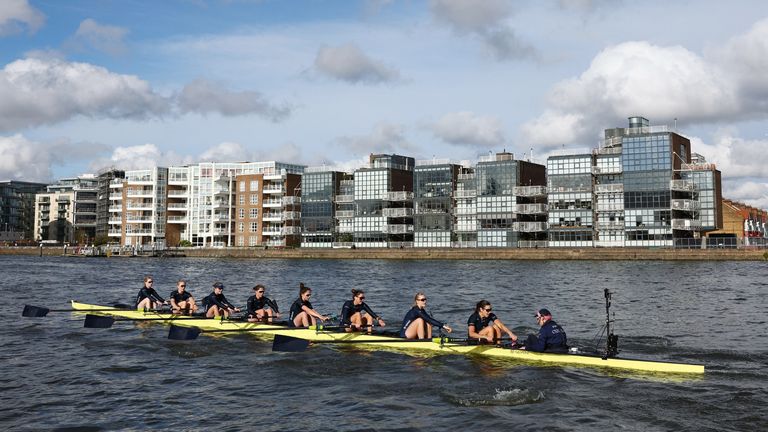Oxbridge Boat Race: Oxford coach criticises 'national disgrace' Thames pollution
"Alarmingly high" levels of E.coli bacteria were found in the Thames days before the historic Oxbridge Boat Race this weekend.
Thursday 28 March 2024 15:09, UK
The University of Oxford's rowing coach has called pollution in the River Thames a "national disgrace" ahead of the historic Boat Race this weekend.
An "alarmingly high" level of E.coli was found along a stretch of the river by River Action and the Fulham Reach Boat Club between 28 February and 26 March.
On Saturday, the University of Cambridge and rivals the University of Oxford will battle it out on the river for bragging rights - and they will row across the stretch where E.coli was found.
"It's a national disgrace, isn't it?" Sean Bowden, the rowing coach for Oxford, said.
"It would be terrific if the Boat Race drew attention to it. We are very keen to play a part and we recognise we have a role and a responsibility to it."
"Why would you want to put your kids out in that?" he told the Daily Telegraph.
His comments came as it also emerged this week that sewage spills in England's rivers and seas reached a record level last year.
There were 3.6 million hours of spills in 2023, more than double the 1.75 million hours recorded in 2022.
Warnings to crews
Crews from the universities competing this weekend have been warned not to jump in the river. The discovery of the bacteria, which in the worst cases can lead to life-threatening blood poisoning, has also cast doubt on the post-race tradition of throwing the winning cox into the water.
River Action, British Rowing and The Rivers Trust have issued new guidance to clubs across the UK.
Rowers have been advised to cover cuts, grazes, and blisters with waterproof dressings, take care not to swallow the water, wear suitable footwear and clean all equipment thoroughly.
'Tragic situation'
James Wallace, head of River Action, said issuing athletes with health guidance ahead of the race on the Thames was a "tragic situation".
"Our water quality results show what happens after decades of neglect by an unregulated water company, Thames Water," he added.
The organisation said rowers, communities and conservationists will be uniting to ask the government to prosecute polluters.
"Everyone should be able to enjoy our rivers and seas without risking their health," Mr Wallace said.
Read more:
Could sewage in the sea lead to higher bills?
Thames Water boss refuses to rule out bill increases
World's 'most polluted' capital city revealed
A Thames Water spokesperson told Sky News on Wednesday: "We have experienced higher than average long-term rainfall across London and the Thames Valley with groundwater levels exceptionally high for the time of the year.
"The overflows are designed to operate automatically when the sewer network is about to be overwhelmed which then releases diluted wastewater into rivers, rather than letting it back up into people's homes.
"We are working hard to make these discharges unnecessary and have published plans to upgrade over 250 of our sites, including a £100m upgrade of our Mogden sewage treatment works in southwest London to treat the high volumes of incoming sewage and reduce the need for overflows during wet weather."
Be the first to get Breaking News
Install the Sky News app for free


E.coli bacteria normally live in the intestines of healthy people and animals. Most strains are harmless, cause relatively brief diarrhea and most people recover without much incident, according to the Mayo clinic.
But small doses of some strains - including just a mouthful of contaminated water - can cause a range of conditions, including urinary tract infection, cystitis, intestinal infection and vomiting, with the worst cases leading to life-threatening blood poisoning.


